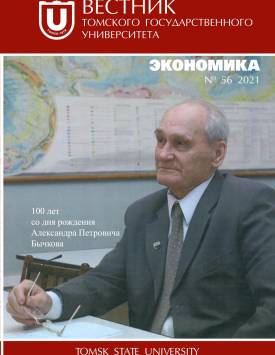Ageism: The Main Directions of Research in Modern Conditions
Research on the nature and consequences of ageism, focused on the study of the limitations of the older generation’s participation in labor activity, has become relevant in recent years due to changes in the age structure of society. The coronavirus pandemic has increased the spread of ageism towards the older generation, since this age group is at greater risk of developing serious illness from COVID-19. The article presents the results of a bibliometric analysis of ageism research in modern conditions, in particular in the context of the spread of the coronavirus pandemic. The aim of the work was to study the diversity of research in the field of ageism based on the definition of thematic clusters of research areas actively developing on this issue. The logic of the conducted research included systematization of the theoretical foundations of ageism studies, assessment of the current state of solving the age discrimination problem, identification of clusters and research trends related to age discrimination that identify a close relationship between discriminatory practices and age-related perception stereotypes concerning the older generation. The methodological approach of the research was based on a bibliometric analysis and consisted in the use of VOSviewer software tools. The material for the analysis was 2,066 articles on the topic of ageism published from 1975 till 2021 in the Web of Science database. The material was analyzed using bibliometry and visualization methods. The obtained results indicate an increase in the number of research on the problems of ageism, including such areas as gerontology, psychology, educational research, nursing, business and economics, social work, etc. The bibliometric analysis shows that North American and European countries lead in the development of this problem. As a result of the research, the following thematic clusters were identified: “Attitudes and Perception Stereotypes”, “Employment of Older People”, “Gerontology”, and “Medical Care”. The results of the study will allow finding opportunities for scientific collaborations to jointly study this problem.
Keywords
age discrimination,
coronavirus pandemic,
COVID-ageism,
bibliometric analysis,
older generationAuthors
| Kalabina Elena G. | Ural State Economic University | kalabina@mail.ru |
| Gazizova Maiya R. | Ural Federal University | gazizova-maiya@mail.ru |
Всего: 2
References
Andersson J, Back J., Ernbrandt T. Svenskama och internet 2020.Intemetstiftelsen. URL: https://svenskarnaochinternet.se/rapporter/svenskarna-ochinternet-2020/fakta-omsvenskarna-och-internet-2020/
Iwarsson S., Aartsen M.J., Wahrendorf M. et al. What will the horrible year of 2020 bring to the future of ageing research? // Eur J Ageing. 2021. № 18. Р. 1-3. URL: https://doi.org/10.1007/s10433-021-00606-w
Ayalon L., Chasteen A., Diehl M., Levy B.R., Neupert Sh.D., Rothermund K., Tesch-Romer C., Wahl H.-W. Aging in Times of the COVID-19 Pandemic: Avoiding Ageism and Fostering Intergenerational Solidarity // The Journals of Gerontology: Series B. 2021. № 76 (2). Р. e49-e52. URL: https://doi.org/10.1093/geronb/gbaa051
Kessler E.M., Bowen K. COVID ageism as a public mental health concern. The Lancet Healthy Longevity. 2020. URL: https://doi.org/10.1016/S2666-7568(20)30002-7
Микляева А.В. Методы исследования эйджизма: зарубежный опыт // Известия Российского государственного педагогического университета им. А.И. Герцена. 2009. С. 148-157. URL: https://cyberleninka.ru/article/n/metody-issledovaniya-eydzhizmazarubezhnyy-opyt
Ventrell C. Ageism//Encyclopedia of Aging // Monsees. 2002. URL: http://www.encyclopedia.com/topic/Ageism.aspx
Levy B.R. Eradication of ageism requires addressing the enemy within // The Gerontologist. 2001. № 41 (5). Р. 578-579.
McGlone E., Fitzgerald F. Perceptions of Ageism in Health and Social Services in Ireland // National Council on Ageing and Older People. 2005. URL: http://www.ncaop.ie/publications/research/reports/85_Ageism.pdf
Bytheway B. Ageism. Buckingham : Open University Press, 1995. 13 р.
Llewellyn N. ‘He probably thought we were students’: Age norms and the exercise of visual judgement in service work // Organization Studies. 2015. № 36 (2). Р. 153-173.
Palmore E. Are the aged a minority group? // Journal of the American Geriatrics Society. 1978. № 26 (5). Р. 214-217.
Macnicol J. Age discrimination: An historical and contemporary analysis. Cambridge : Cambridge University Press, 2006. P. 308.
Carmichael F., Claire H., Porcellato L., Ingham B., Prashar A. Ageism and age discrimination // Managing age diverse workforce / eds. by E. Parry, S. Tyson. 2011. Р. 115-129.
Cuddy A., Fiske S. Doddering but dear: Process, content, and function in stereotyping of older persons // Ageism: Stereotyping and prejudice against older persons / ed. by T.D. Nelson. 2000. Р. 3-26.
Baars J., Dannefer D., Phillipson C., Walker A. Aging, globalization, and inequality: The new critical gerontology. New York : Baywood Publishing Company, 2006. URL: https://doi.org/10.1177/009430610703600249
Бахматова Т.Г., Зимина Е.В. Библиометрический анализ тенденций в изучении социальных медиа // Вопросы теории и практики журналистики. 2019. Т. 8, № 2. С. 274-291. DOI: 10.17150/2308-6203.2019.8(2).274-291
Трушкова Е.А. Библиометрический анализ научных публикаций по вопросам исследования анклавов // Демографический потенциал стран ЕАЭС : VIII Уральский демографический форум. Т. II. Екатеринбург : Институт экономики УрО РАН, 2017. С. 370-375.
Калабина Е.Г., Газизова М.Р., Хусаинова Ж.С. Структурная динамика занятости населения старшего возраста стран - участниц Евразийского экономического союза // Экономика региона. 2021. Т. 17, вып. 3. С. 842-854. URL: https://doi.org/10.17059/ekon.reg.2021-3-9

